Redditor Gets Termed A Bully For Rudely Correcting Classmate Who "Saves Goldfish" By Releasing Them Into The Ocean
The living environment is crucial for the various species of goldfish. Even though you may be aware that goldfish live in freshwater, you could still question if they also reside in the ocean due to the fact that some individuals release goldfish into wild water.
Since goldfish are freshwater fish, the water's salinity must be kept below a specific threshold. When exposed to seawater, goldfish are unable to survive because the salinity is too high for them to endure.
Goldfish suffer from severe dehydration as a result of the excessive ions present in the water due to the high salinity level. Around 35 ppt of salt is present in the ocean, which is a saltwater environment.
This indicates that each kilogram of water contains 35 grams of dissolved salts. Additionally, as goldfish are freshwater creatures, their environment presumably has a salinity of zero.
As a result, if they are in seawater, they are susceptible to dehydration, which causes their cells to lose water and eventually die. This information was what a Redditor named u/Sensitive-Fun-99 tried to pass on to the classmate who was "saving goldfish" by releasing them into the ocean.
Even though the classmate was wrong in her actions, the OP didn’t convey the message nicely. Keep scrolling down to read how the whole story unfolded as you keep scrolling down.
More Info: Reddit
The OP's classmate thought goldfishes were being saved by releasing them into the ocean

Hey, come check out my TikTok
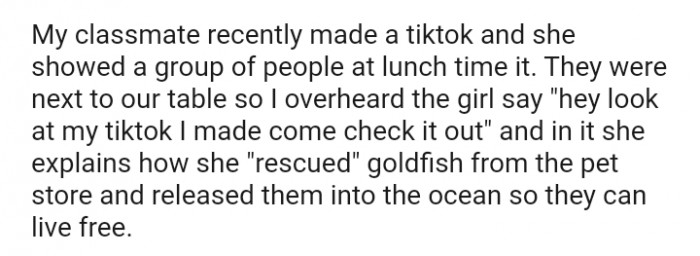
Why would you say that because she cares...

Social psychologists emphasize the importance of empathy in conflict situations. When individuals engage in rude corrections, it often reflects a lack of understanding of the other person's perspective, which can lead to defensiveness and conflict escalation.
Research published in the Journal of Personality and Social Psychology shows that empathy training can reduce interpersonal conflict significantly. Such training encourages individuals to consider others' feelings, leading to more constructive communication and less bullying behavior.
In situations where individuals feel attacked or criticized, defensive responses often emerge. This reaction can be understood through the lens of attachment theory, which highlights how early experiences shape adult interactions.
Research in attachment studies shows that individuals with insecure attachment styles may react more strongly to perceived threats, leading to aggressive or defensive behaviors. Encouraging secure attachments through supportive relationships can help individuals respond more constructively in conflict situations.
The Psychology of Moral Outrage
Dr. James Parker, a social psychologist, explains that moral outrage often arises from a sense of injustice.
His research indicates that when individuals perceive behaviors that violate their moral standards, they are likely to react strongly, sometimes without considering the full context.
This reaction may be rooted in a desire to protect societal norms and values.
The OP's parents were called over
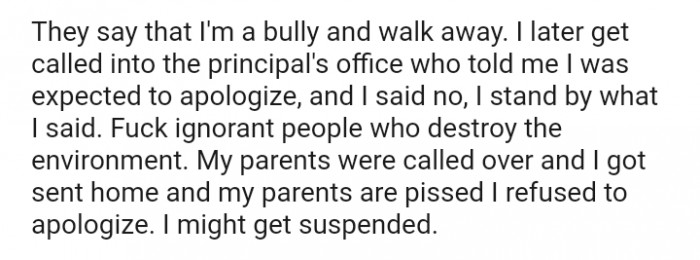
The Reddit thread has over 37K upvotes with close to 4,000 comments. We've gathered a bunch of the most upvoted comments from Redditors for you to read through below.
The situation was handled poorly

Your classmates did nothing to help those animals

The phenomenon of 'social bullying' can often be traced back to cognitive biases, particularly the 'fundamental attribution error.' This bias occurs when individuals misinterpret others' actions, attributing them to personal flaws rather than situational factors.
As noted by Dr. Ramani Durvasula, a clinical psychologist, "People often fail to consider the context in which someone acts, leading to harsh judgments that can perpetuate stigma." Recognizing this bias is the first step toward fostering a more compassionate social environment, as emphasized by Dr. Sonja Lyubomirsky, who states, "Understanding the situational factors influencing behavior can help cultivate empathy and reduce social bullying."
The response to the classmate's actions can also be viewed through the lens of social identity theory, which suggests that individuals derive a part of their self-esteem from their group memberships.
When actions from others in one's social circle threaten these identities, it can provoke intense emotional reactions.
The delivery is wrong

"You realize you're a dumba** right"
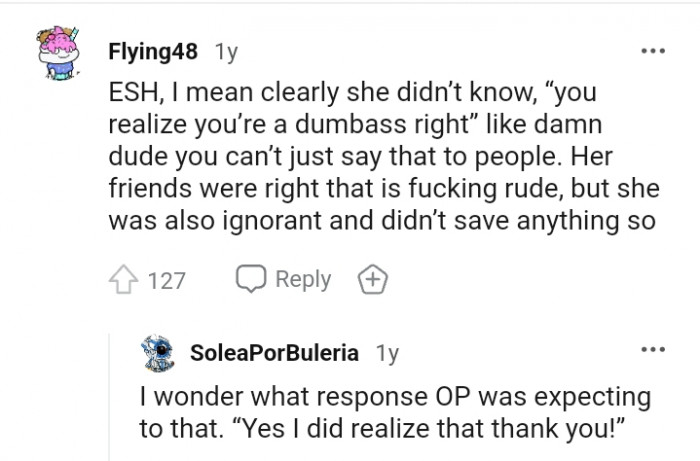
Education and sharing knowledge goes a lot farther
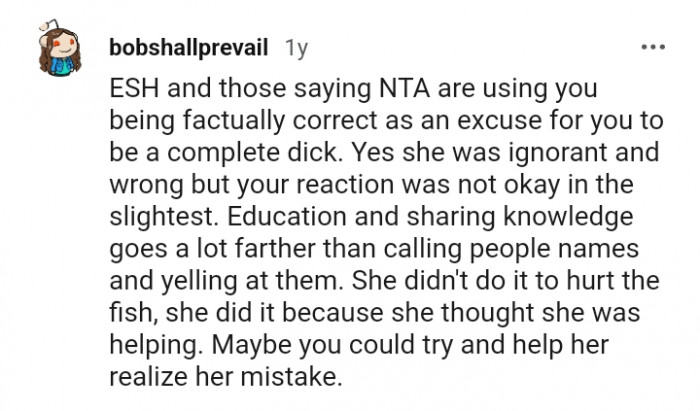
Research in behavioral psychology highlights the role of reinforcement in shaping behavior. When someone is labeled a 'bully' for correcting others, it can discourage such behavior in the future, promoting a culture of kindness.
Experts suggest that positive reinforcement, such as praise for supportive interactions, can encourage individuals to engage in more constructive behaviors. Furthermore, addressing bullying through restorative practices, which focus on repairing harm, can foster empathy and better social interactions in academic settings.
Considering Alternative Perspectives
To foster a more constructive dialogue, experts suggest adopting a perspective-taking approach. This involves trying to understand the motivations and circumstances that led to the behavior.
Research suggests that engaging in perspective-taking can reduce hostility and promote empathy, allowing for more productive discussions.
She did not do the slightest bit of research

Insulting someone because of this is totally wrong
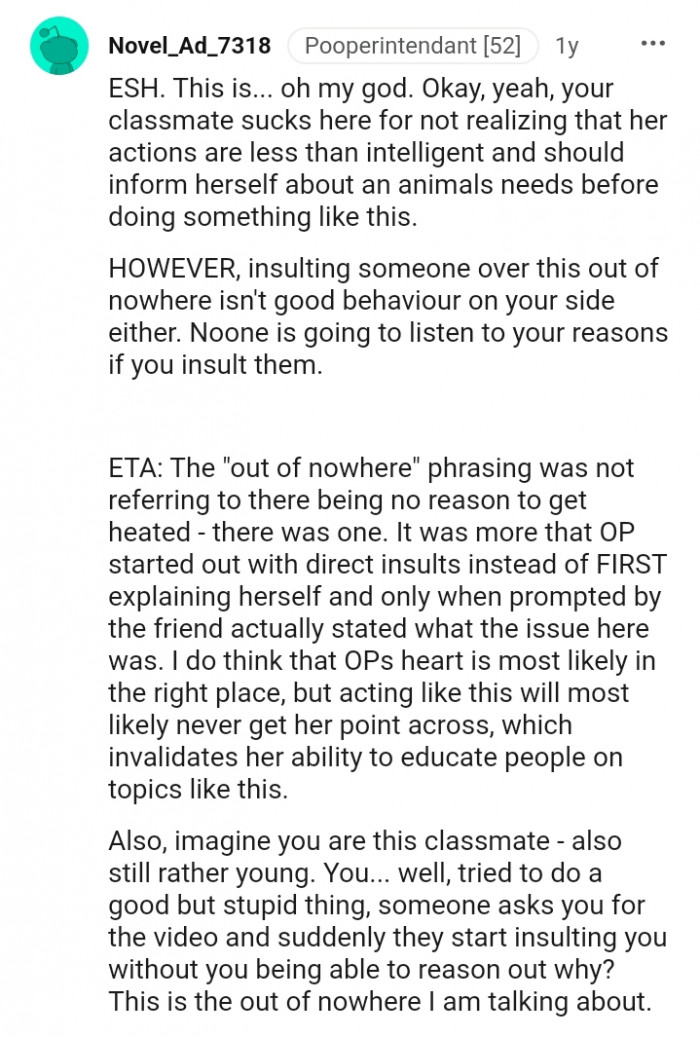
Calling names is one of the least effective ways
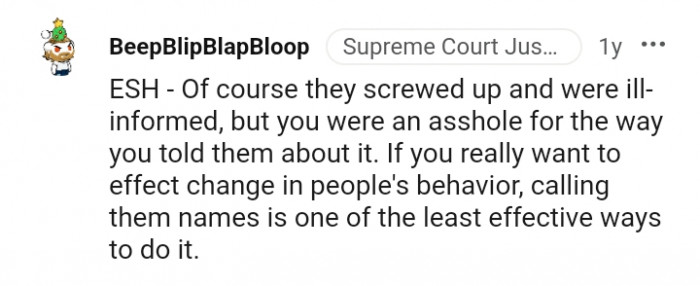
According to Dr. John Gottman, a leading relationship researcher, emotional intelligence is fundamental to effective communication. His studies indicate that individuals with higher emotional intelligence are better at navigating conflicts, including situations involving rude corrections.
By fostering skills like emotional awareness and empathy, students can learn to approach disagreements with sensitivity, enhancing their interpersonal relationships. Programs incorporating emotional intelligence training have shown promise in improving peer interactions and reducing bullying incidents in educational environments.
Studies in the Journal of Personality and Social Psychology show that when individuals practice empathy, they can mitigate feelings of anger and resentment, leading to healthier interactions.
This can be particularly beneficial in conflict situations, where understanding can pave the way for resolution.
Calling someone names is not a good move

Belittling them with zero tact

Activism does more harm than good

Developmental psychologists note that peer feedback plays a crucial role in shaping self-esteem during adolescence. When interactions become harsh or judgmental, it can lead to a decline in self-worth and increase anxiety.
Research published in the Journal of Youth and Adolescence suggests that creating supportive peer networks can buffer against the negative effects of bullying. Encouraging students to support one another can foster resilience and promote healthier self-perceptions.
The stark reality check on the OP's part

She didn't need your help to get humiliated

You missed a huge opportunity here
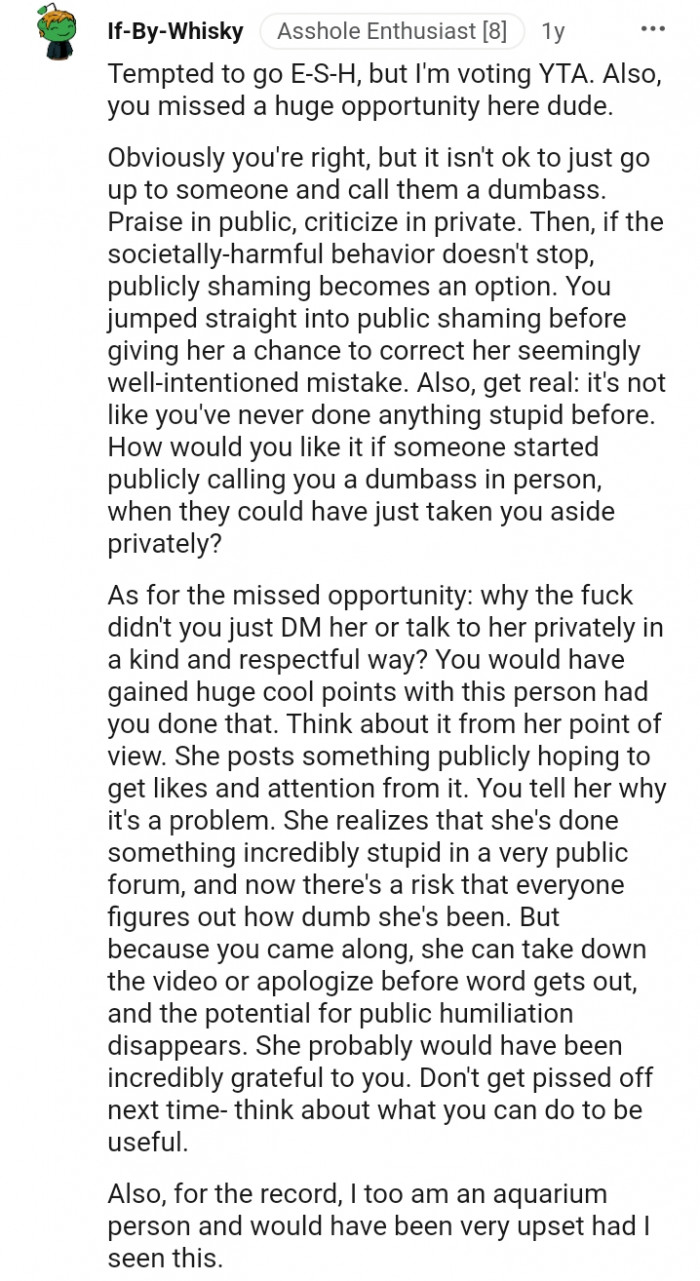
In educational settings, fostering a culture of respect and support is vital. Programs that teach conflict resolution and communication skills can significantly reduce instances of bullying behavior. As Dr. Angela Duckworth, a renowned character researcher, states, "Teaching kids how to resolve conflicts peacefully is essential for their development and the health of the school community." Implementing peer mediation programs, as suggested by her research, encourages students to resolve conflicts amicably. These skills not only mitigate immediate conflicts but also promote long-term social cohesion and understanding.
You know those are freshwater fishes right?
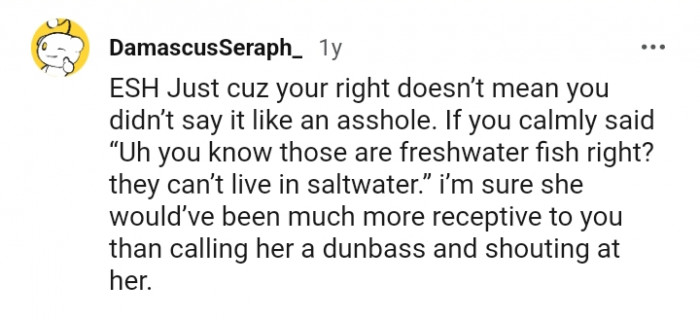
You can't communicate in a way that makes people want to listen
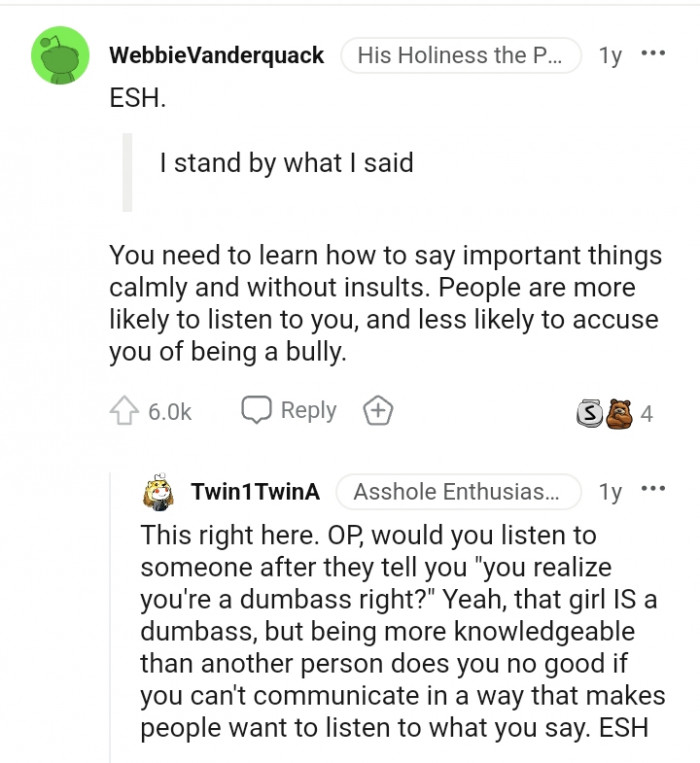
You can gently correct someone's incorrect understanding
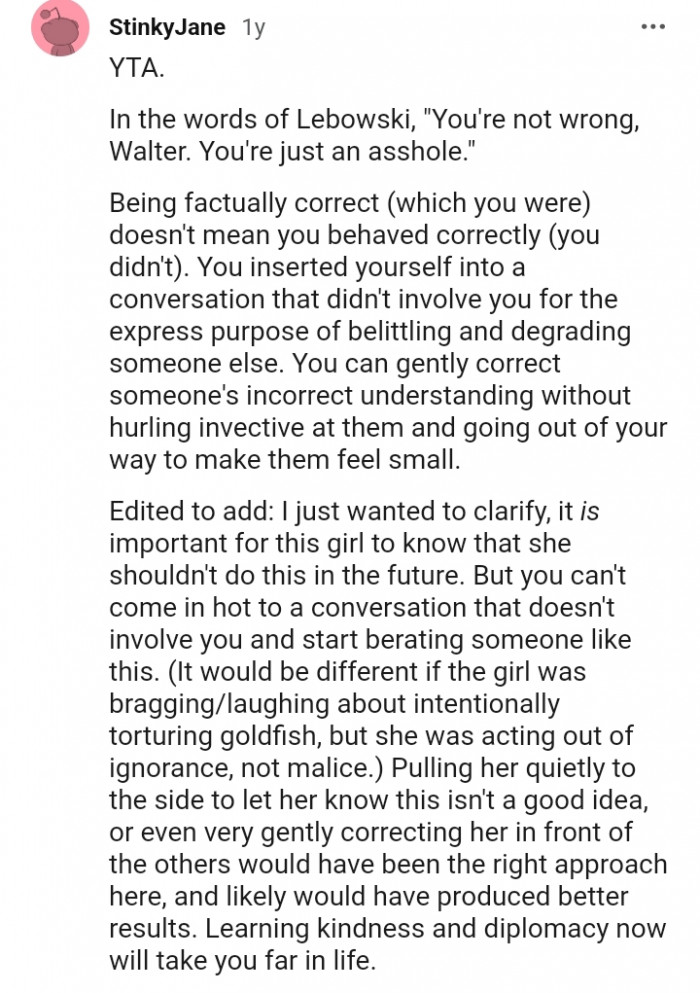
The concept of cognitive dissonance explains why individuals may feel compelled to correct others rudely. When someone perceives a threat to their beliefs, they might react defensively to restore their sense of superiority.
Research conducted by cognitive psychologists indicates that awareness of this phenomenon can encourage individuals to pause before reacting. By practicing mindfulness, they can create space for more thoughtful responses, reducing the likelihood of bullying behaviors and fostering a more respectful dialogue.
Your classmate is a well meaning...
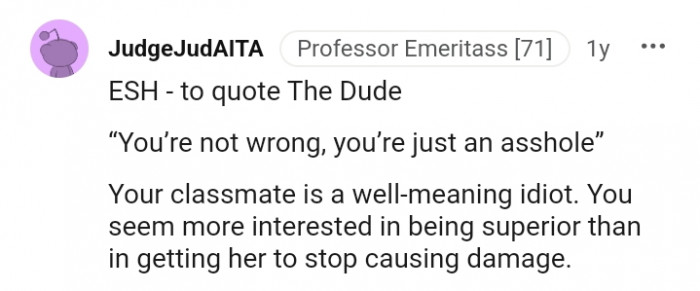
You would have done so without the swearing and insulting
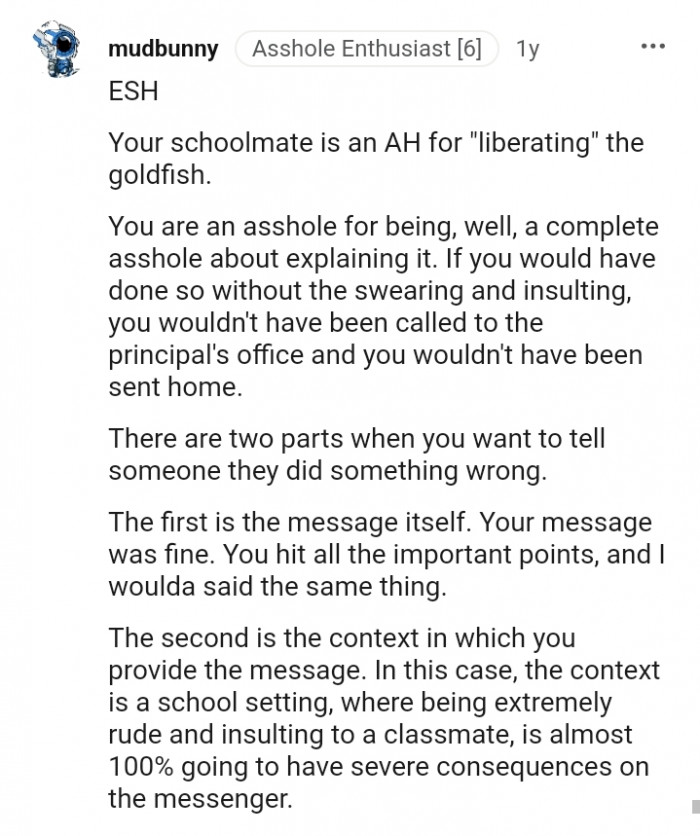
People who are ignorant need to warm up their brains
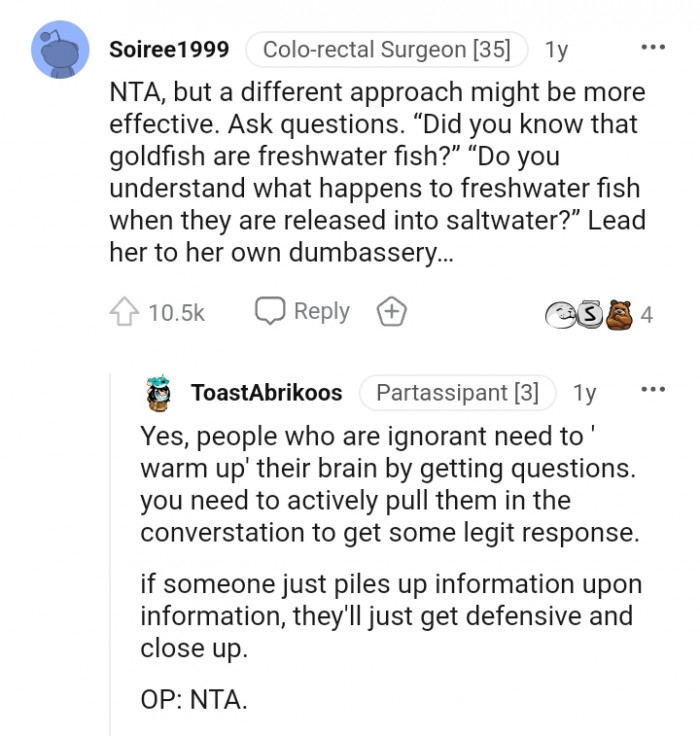
Social learning theory posits that individuals learn behaviors through observation and imitation. When students witness rude corrections, they may internalize this behavior as acceptable, perpetuating a cycle of negativity.
Educators can break this cycle by modeling positive interactions and providing opportunities for cooperative learning. According to research from Stanford University, collaborative projects can enhance empathy and decrease instances of bullying, helping to cultivate a more supportive community.
Yes, the point was completely valid and worth mentioning, but the way the OP went about it was such a bad move! Some Redditors called the OP out for it, while others were of the opinion that the OP was right.
What are your thoughts regarding this story? Share them with us by leaving a comment below.
Psychological Analysis
This situation highlights how moral outrage can lead to conflict, especially when individuals feel their values are challenged. It's essential to approach such situations with a mindset of understanding rather than judgment.
Analysis generated by AI
Analysis & Alternative Approaches
Understanding the roots of moral outrage can help individuals tailor their responses more effectively.
As psychological research emphasizes, 'Context matters - understanding the reasons behind actions can lead to more empathetic responses.'
Building Healthier Patterns
Understanding the psychological dynamics behind rude corrections can offer valuable insights into fostering healthier communication. Emphasizing empathy, emotional intelligence, and conflict resolution skills can significantly improve peer interactions.
Research shows that implementing programs focused on emotional development and supportive environments can mitigate bullying and promote positive relationships. By prioritizing these approaches, educators and students can create a more inclusive and respectful atmosphere that benefits everyone's well-being.



